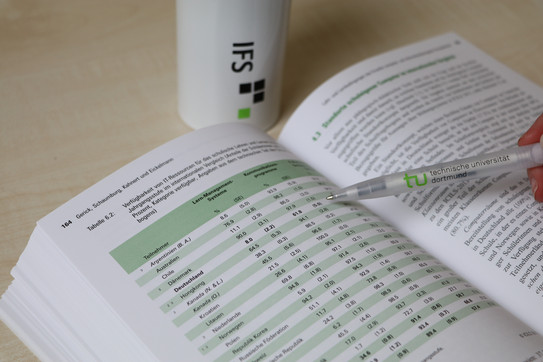Profile of the Center for Research on Education and School Development
The Center for Research on Education and School Development at TU Dortmund University is one of the largest school and educational research institutes in Germany. Founded in 1973, it deals with current issues in empirical education and school development research. How can educational processes and successes be described, explained and optimized? What effects do school reforms and school development processes have? To what extent are teaching situations perceived differently by teachers and learners? And what opportunities for teaching and learning are inherent in diversity?
Information about the Center for Research on Education and School Development
The Center for Research on Education and School Development (IFS) at the TU Dortmund University is committed to all areas of education research – from the description, explanation, and improvement of the organization and management of schools and the school system, to the analysis of educational processes and educational outcomes of students of different age groups in different contexts. Not limited to students, the research takes into account parents, teachers, school administration, and institutional frameworks. A special focus is research into the reform and development processes of schools and the school system, as well as the necessary conditions for these processes and their outcomes.

In the main research areas, various important levels at which education-related developments take place in the social context are systematically reflected upon and included in the empirical investigations: the educational system, the school, the class or learning group, and the individual students and their families. Educational and school development research at the IFS covers topics from all central areas of school development. In addition to the thematic areas, the area of research methods complements the focus of the IFS.
The various aspects of school development form the framework of research at the Institute. The research work at the IFS and within the individual projects
is characterized in particular by three overarching features:
- Interdisciplinarity: IFS staff members conduct research in interdisciplinary teams. In particular, educational, psychological, didactic, and sociological theories are discussed, further developed, and empirically tested on central topics of empirical education and school research.
- Multimethodological approach: Depending on the research project, the IFS uses a variety of research designs (e.g., longitudinal, large-scale, experimental, intervention), data collection methods (e.g., questionnaires, interviews, competency tests, videography, serious educational games), and quantitative and qualitative evaluation methods.
- International, national and regional location and practical relevance: The IFS maintains international and national research partnerships and is very well networked with the regional school landscape as well as within the TU Dortmund University. In addition, the institute actively participates through publications, lectures and
- In addition, the Institute actively participates in the international discourse in the field of empirical educational research through publications, lectures, and conference contributions as well as through interdisciplinary collaborative research projects. The interdisciplinary exchange across national borders and the direct relevance of many research projects to practice make in their combination a special strength of the institute.





![[Translate to English:] [Translate to English:]](/storages/ifs-ep/_processed_/3/0/csm_iStock-1180187740_Orbon_Alija_bc1514e180.jpg)